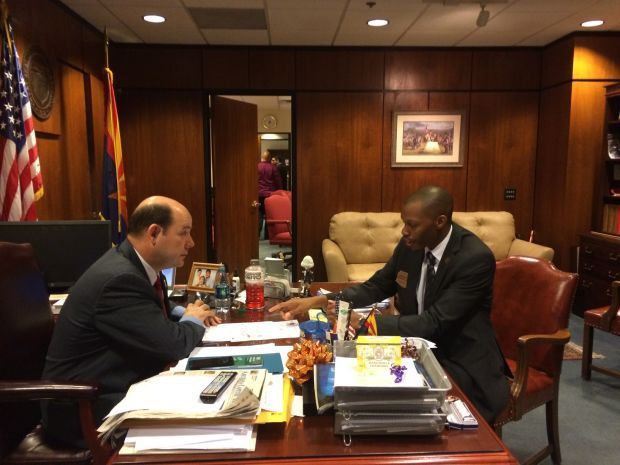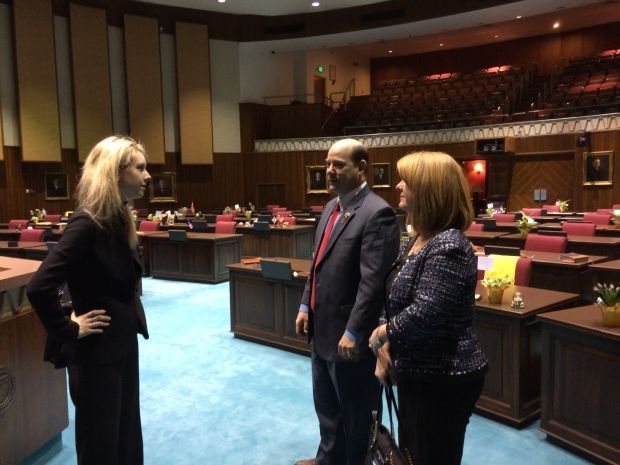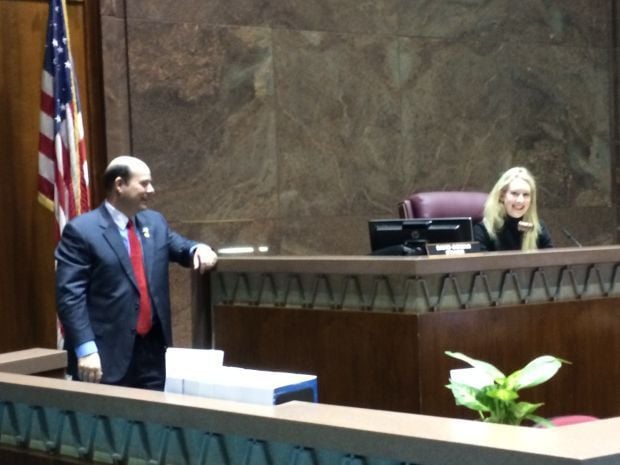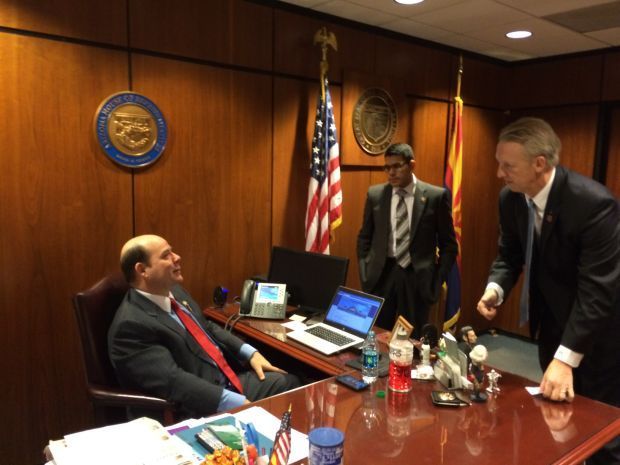The billionaire entrepreneur pressed on in her pitch to the House Speaker, perhaps not realizing she already had him convinced.
Elizabeth Holmes, founder and CEO of a biomedical company called Theranos, told House Speaker David Gowan and an assembled group that she felt at home in his meeting room with its cardboard cut-out of Ronald Reagan in the corner.
“George Shultz is my mentor,” she said Tuesday morning, referring to the man who was secretary of state under Reagan. “George Shultz and Henry Kissinger are on my board.”
She went on to drive home the point, saying her company’s aim, and the point of a bill she was pushing, is to “create free market competition to drive prices down and increase transparency” in medical testing. The bill, HB 2645, would allow people to get blood tests without a doctor’s order — tests her company would provide at Walgreens stores.
Mostly quiet to this point, Gowan roused himself and interjected in his understated way: “You’re talking to free-market-minded people here so you’re talking in the right tone.”
Gowan, a Sierra Vista Republican, is the first speaker of the House from Southern Arizona since Joe Lane of Cochise County in 1988. Many Capitol observers have been surprised by the rise of a legislator who presents himself as a simple man from a rural district.
But it was no accident how Gowan, 45, got there. A conservative Republican, he was House Majority Leader, the second-in-command on the Republican side, last session, so he was an obvious choice for speaker. Last summer and fall, as the elections came and went, he already had support from some members of the so-called “Liberty Caucus.”
The key to victory, or so goes the story told around the Capitol, was that he assured the seven Republicans members who voted for Gov. Jan Brewer’s Medicaid expansion in 2013 that they would not be excluded because of those votes, which remain hotly controversial among Republicans.
That allowed him to defeat formidable opponents Reps. Eddie Farnsworth of Mesa and J.D. Mesnard of Chandler for the speakership.
Bob Robson, who was one of those pro-Medicaid Republicans, became speaker pro tem under Gowan. Robson told me Gowan won because, “He had a willingness to be open.”
Ethan Orr, a former Republican legislator from Tucson who was narrowly defeated in November, confirmed that Gowan wisely made peace with him and other pro-Medicaid Republicans, despite their disagreement on the issue.
“He is very politically astute,” Orr said. “Of all the people who were aiming to be in leadership, he was the one who understood every faction and had communication with them.”
About three weeks ago, I asked if I could spend some time with Gowan as he went about his duties. That opportunity came Tuesday, a whirlwind mid-session day. I spent three or four hours with Gowan, as colleagues and assistants regularly ducked in their heads from a variety of doors that surround the speaker’s windowless office.
We were apart for lunch and a for meeting that had to do with a personal conflict in the House, but otherwise I was allowed to hang around.
This wasn’t without some risk for Gowan, considering the apparent political differences between us. His main idea as it pertains to government seems to be to shrink it.
“What we’re looking at is trying to get a structurally balanced budget,” he said. “Everything’s on the table, and we’re asking everyone to make sure that they’re able to tighten up those belts.”
As I’ve written, I don’t agree with the predominant point of view in Phoenix that simply cutting spending is the best path forward for Arizona. One thing we do agree on, however, is in our high hopes for Southern Arizona. Gowan says his claiming the seat of speaker could help our region.
“I’m a rural Southern (Arizona) guy, and I bring up ideas from those areas,” he said. “I’m a member of District 14 from my southeast region, and I’m a watchdog for them. But when you become speaker, you become speaker for the entire state.”
Robson, a veteran of the Legislature, explained, “I think you lose that definition of where you’re from because you’re trying to make the trains run on time.”
That may be Gowan’s biggest challenge. When I asked him about his priorities as speaker, he didn’t say cutting taxes or making abortion illegal or attracting new businesses. He mentioned his experience as a highly trained martial artist and the emphasis in that practice on what he called “etiquette.”
“It’s the management part I enjoy,” Gowan said of the speakership. “I like etiquette and I like protocol. Those are the areas that I wanted to be sure the House had.”
“It doesn’t mean I’m deviating from my principles and that kind of stuff,” he added. “It does mean that as we have discussions with each other and put forward ideas, that we do it in a cordial fashion.”
A skeptic would say that means shaking a Democrat’s hand before you toss his bill in the wastebasket. But Gowan insists it’s deeper than that.
Tuesday afternoon, he made time for a freshman Democrat, Reginald Bolding Jr., of Phoenix, to come in and pitch an idea. Bolding’s bill would allow for “social impact bonds” that would give investors a return for putting money into the successful education of special-needs students.
“If students no longer need special education services, then they get their money plus a return on investment,” Bolding said.
Gowan listened quietly and reminded Bolding that he had assigned the bill to a committee, which is where Bolding really had to do his convincing. Bolding succeeded: Unlike most Democratic bills, his passed out of the committee on Wednesday.
The speaker was alone with Bolding, but one-on-one meetings are relatively rare occurrences, if Tuesday was any indication. Majority Leader Steve Montenegro frequently came and went. Executive assistant Becca Farmer interrupted to say when it was time for the next event. Rep. David Stevens, who represents the same southeastern Arizona district as Gowan, was almost omnipresent.
One exception to the big-group affairs has been meetings in the governor’s office with Senate President Andy Biggs, Gowan said.
“The president and I often go up and sit down one-on-one-on-one,” he said. “We just talk about issues of the day. We haven’t talked about issues of budget yet.”
Perhaps it’s a good thing Gowan doesn’t bring along Stevens, who irrepressibly cracks jokes, funny or not. Introducing himself to strangers as David Gowan is an occasional gag.
Montenegro, Farmer and Stevens were all in the room as the meeting with entrepreneur Holmes and her entourage wound down. Gowan turned the teasing on Stevens.
“You should come in and test his blood,” Gowan told Holmes, gesturing to Stevens. “He’s been around since Lincoln’s day.”
Stevens retorted: “He wants to count my rings, but I won’t let him.”
Now the situation became clear to Holmes, the intense young entrepreneur, and her team. The guys’ distracted razzing meant the half-hour meeting was over. The speaker was sold.








